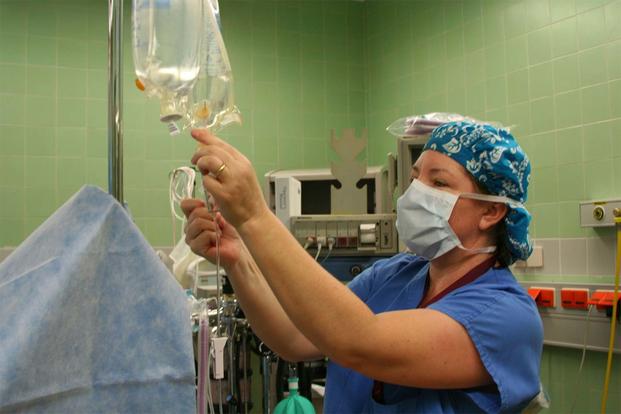Advocates are pushing the Veterans Affairs Department to add nurse anesthetists to the types of nurse practitioners who can treat veterans without the supervision of doctors.
In a major shift designed in part to shorten wait times for patients, the VA last week announced plans to allow three types of nurse practitioners -- certified nurse practitioner (CNP), clinical nurse specialist (CNS), and certified nurse-midwife (CNM) -- "to practice to the full extent of their education, training and certification, without the clinical supervision or mandatory collaboration of physicians," according to a new rule slated to take effect Jan. 13.
Now, advocates want VA officials to add certified registered nurse anesthetists (CRNAs) to the list.
"We're very disappointed in the ruling. We don't believe that it goes the distance towards providing access to care for the veterans," Cheryl Nimmo, the president of the American Association of Nurse Anesthetists, said in an interview with Military.com this week.
"Currently there are many backlogs of patients waiting for specific procedures that require anesthesia, and without allowing CRNAs to also have full practice authority, [the ruling] does nothing to alleviate that backlog," she added.
The VA's move to empower nurse practitioners is designed in part to decrease wait times for patients who are seeking treatment in underserved areas with physician shortages, according to a rule published last week in the Federal Register. It marks the first time the VA established a nationwide framework for such specialists to provide direct care to vets throughout its system.
RELATED: Nurse Practitioners to Treat Vets Without Doctor Supervision
But the new provision doesn't cover certified registered nurse anesthetists because the VA doesn't currently face a shortage of anesthesiologists, according to the rule. The department is requesting comment "on whether there are access issues or other unconsidered circumstances that might warrant their inclusion in a future rulemaking," it states.
According to data from a RAND study, analyses show that in fiscal 2014, the VA employed or otherwise utilized about 600 certified registered nurse anesthetists. Today, the figure is closer to 900 nurse anesthetists, Nimmo said.
The American Medical Association, the nation's largest association of physicians, has opposed the VA's rule and also opposes granting full practice authority to certified registered nurse anesthetists, arguing that the move weakens the practice of physician-centric care and could lead to more medical safety issues.
Nimmo fired back at that criticism, saying, "Anytime we have a patient to take care of, there are multiple healthcare professionals involved in taking care of that patient. To say that the team has to be physician-centric, I think is a misnomer. The team needs to be patient-centric."
The RAND study, published in 2015, argued in favor of using nurse practitioners in more roles across the VA spectrum. While the researchers sparingly mentioned the use of anesthetists, they didn't dispute the specialists' critical role in the department. The report also referenced a 2010 study, "No harm found when nurse anesthetists work without supervision by physicians," which analyzed seven years of Medicare data.
Although that study primarily focused on centers for Medicare and Medicaid services and reimbursement statutes, more broadly, the research found that a physician supervision requirement for certified registered nurse anesthetist "was not associated with increased risks to patients."
In the final recommendation of the study, health economist Brian Dulisse wrote, "Based on our findings, we recommend that [centers for Medicare and Medicaid services] allow certified registered nurse anesthetists in every state to work without the supervision of a surgeon or anesthesiologist."
Nimmo, who herself has read "about 10 outcome studies," said, "anesthesia is 50 times safer now than it was 30 years ago" so the arguments over safety concerns "are erroneous."
Nimmo said AANA and other supporting organizations such as Advanced Practice Nurses Association and some lawmakers such as Sens. Dick Durbin of Illinois and Jeff Merkley of Oregon, both Democrats, expect lots of positive input to the VA before the open-forum commentary period ceases.
The regulatory change to include nurse practitioners will take effect next month, but a decision on whether anesthetists should remain unsupervised will be included in a future rulemaking, the VA said.
AANA will argue the addition of nurse anesthetists will give veterans better access to more healthcare professionals and help alleviate wait times and claim backlogs. What's more, adding certified anesthetists to the list of approved specialists "won't cost the [VA] one penny more," Nimmo added.
One of many areas they could provide help is with the opioid epidemic -- the overuse of morphine-like drugs that produce euphoric side effects for those in chronic pain, which some veterans are afflicted by.
Nurse anesthetists "are well-prepared and well-qualified to step in and provide that service" to alleviate pain in a controlled manner, Nimmo said.
-- Oriana Pawlyk can be reached at oriana.pawlyk@military.com. Follow her on Twitter at @Oriana0214.






























